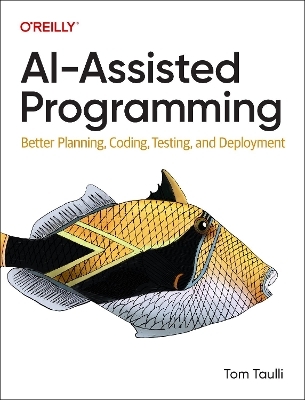
AI-assisted programming
better planning, coding, testing, and deployment
Seiten
2024
|
1. Auflage
O'Reilly Media (Verlag)
978-1-0981-6456-0 (ISBN)
O'Reilly Media (Verlag)
978-1-0981-6456-0 (ISBN)
Get practical advice on how to leverage AI development tools for all stages of code creation, including requirements, planning, design, coding, debugging, testing, and documentation. With this practical book, beginners and experienced developers alike will learn how to use a wide range of tools, from general-purpose LLMs to code-specific systems.
Get practical advice on how to leverage AI development tools for all stages of code creation, including requirements, planning, and design; coding; and debugging, testing, and documentation. With this practical book, beginners and experienced developers alike will learn how to use a wide range of tools, from general-purpose LLMs (ChatGPT, Bard, and Claude) to code-specific systems (GitHub Copilot, Tabnine, Cursor, and Amazon CodeWhisperer).
You'll also learn about more specialized generative AI tools for tasks such as text-to-image creation.
Author Tom Taulli provides a methodology for modular programming that aligns effectively with the way prompts create AI-generated code. This guide also describes the best ways of using general purpose LLMs to learn a programming language, explain code, or convert code from one language to another.
This book examines:
The core capabilities of AI-based development tools
Pros, cons, and use cases of popular systems such as GitHub Copilot and Amazon CodeWhisperer
Ways to use ChatGPT, Bard, Claude, and other generic LLMs for coding
Using AI development tools for the software development lifecycle, including requirements, planning, coding, debugging, and testing
Prompt engineering for development
Using AI-assisted programming for tedious tasks like creating regular expressions making chron jobs and GitHub Actions
How to use AI-based low-code and no-code tools
Get practical advice on how to leverage AI development tools for all stages of code creation, including requirements, planning, and design; coding; and debugging, testing, and documentation. With this practical book, beginners and experienced developers alike will learn how to use a wide range of tools, from general-purpose LLMs (ChatGPT, Bard, and Claude) to code-specific systems (GitHub Copilot, Tabnine, Cursor, and Amazon CodeWhisperer).
You'll also learn about more specialized generative AI tools for tasks such as text-to-image creation.
Author Tom Taulli provides a methodology for modular programming that aligns effectively with the way prompts create AI-generated code. This guide also describes the best ways of using general purpose LLMs to learn a programming language, explain code, or convert code from one language to another.
This book examines:
The core capabilities of AI-based development tools
Pros, cons, and use cases of popular systems such as GitHub Copilot and Amazon CodeWhisperer
Ways to use ChatGPT, Bard, Claude, and other generic LLMs for coding
Using AI development tools for the software development lifecycle, including requirements, planning, coding, debugging, and testing
Prompt engineering for development
Using AI-assisted programming for tedious tasks like creating regular expressions making chron jobs and GitHub Actions
How to use AI-based low-code and no-code tools
Tom Taulli (@ttaulli) is a consultant to various companies, such as Aisera, a venture-backed generative AI startup. He has written several books like AI Basics and Generative AI, which covers ChatGPT, GPT-4 and other large-language models (LLMs). Tom has also taught IT courses for O'Reilly, UCLA andPluralSight. For these, he has provided lessons in using Python to create deep learning and machine learning models. He has also taught on topics like NLP (Natural Language Processing).
| Erscheinungsdatum | 23.04.2024 |
|---|---|
| Reihe/Serie | Animals |
| Zusatzinfo | Illustrationen |
| Verlagsort | Sebastopol |
| Sprache | englisch |
| Maße | 178 x 233 mm |
| Einbandart | kartoniert |
| Themenwelt | Mathematik / Informatik ► Informatik ► Programmiersprachen / -werkzeuge |
| Informatik ► Theorie / Studium ► Künstliche Intelligenz / Robotik | |
| Mathematik / Informatik ► Informatik ► Web / Internet | |
| ISBN-10 | 1-0981-6456-3 / 1098164563 |
| ISBN-13 | 978-1-0981-6456-0 / 9781098164560 |
| Zustand | Neuware |
| Informationen gemäß Produktsicherheitsverordnung (GPSR) | |
| Haben Sie eine Frage zum Produkt? |
Mehr entdecken
aus dem Bereich
aus dem Bereich
Buch | Hardcover (2012)
Westermann Schulbuchverlag
CHF 44,90
Schulbuch Klassen 7/8 (G9)
Buch | Hardcover (2015)
Klett (Verlag)
CHF 29,90


